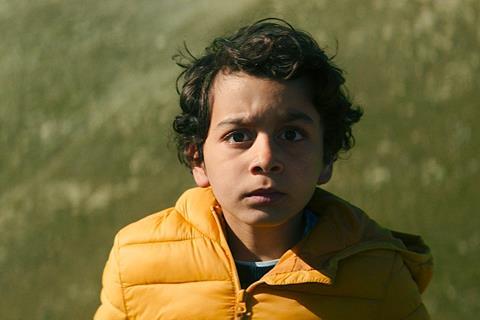A Tunisian man becomes convinced he can fly in Mohamed Ben Attia’s intriguing third feature

Dir/scr: Mohamed Ben Attia. Tunisia/Bel/Fr/It/Saudi Arabia/Qatar. 2023. 98mins.
Further proof of the current vitality of North African cinema, Tunisian writer-director Mohamed Ben Attia’s sombre third feature doesn’t offer itself up to easy interpretation. By turns edgy thriller and supernatural fantasy, this tale of a man who may or may not be able to fly is perhaps a little too open to multiple readings. But it is nevertheless a striking piece of filmmaking that lingers stubbornly in the mind. There is a certain frostiness about the exercise at times that, together with the story’s slow-burn build, will likely confine Behind the Mountains to resilient arthouse audiences, especially in Francophone Europe. But, in the right hands, this challenging film has the potential to work very well within that niche.
Further proof of the current vitality of North African cinema
Co-produced by the Dardenne brothers, like Ben Attia’s previous films Hedi (2016) and Dear Son (2018), Behind the Mountains is equally rooted in the social tensions and fissures of contemporary Tunisia – but this time the drama evolves into something very close to a parable. Majd Mastoura, who played the title character in Hedi, is back again playing a man with problems. There he was a dithering windvane of a young man torn between two women; here he is Rafik, a troubled father and husband with mental health issues who has served four years in jail for smashing up the office where he used to work before throwing himself from a window. Soon after release, he kidnaps his young son Yassine (Walid Bouchhioua) from school and drives up into the mountains, where he plans to show off his superpower to his son.
The film plays teasingly with the issue of whether Rafik can actually fly, keeping the camera on his dreamer of a son distractedly watching, rather than dad soaring through the air. But, whatever Rafik did, it’s enough to impress a simple-minded shepherd played by Samer Bisharat, who decides to follow father and son on the next stage of their journey. After fleeing a police roadcheck, Rafik muscles his way into a remote country house with his two hangers on – the dim yet loyal shepherd-disciple and Yassine, who becomes the emotional lightning conductor of a film with few truly likeable characters. He has a child’s blind trust in his father, though we know Rafik does not even trust himself.
Behind The Mountains can be read as a thriller, one that reaches a peak in the tense stand-off between Rafik and the middle-class family whose house he, Yassine and the shepherd have invaded. But this is also very much a film about a mental health crisis. (Ironically, the weapon of choice that the woman, played by the excellent Selma Zghidi, uses against the men who have invaded her house is her anxiety medication, dissolved into a drink).
It is also, like Ben Attia’s first two features, a story about a man who feels disempowered and marginalised. Majd Mastoura is intense as the haunted, desperate Rafik, but he has a quietness and dignity too, one that comes out in particular in his utter conviction that he is able to leap from high places and remain soaring in the air. It’s a conviction so strong that it makes converts.
Dealt with delicately throughout, with a minimum of special effects work, the flying theme attracts a cluster of meanings. Is it the sad delusion of an unbalanced, resentful man or a noble striving for some purer path that leaves the weight of the world behind? It is clear that we can’t fly just by thinking we can, Ben Attia suggests – but on the other hand, we will never fly if we do not believe it is possible.
Production company: Nomadis Images
International sales: Luxbox, info@luxboxfilms.com
Producers: Dora Bouchoucha, Lina Chaabane Menzli
Production design: Fatma Madani
Editing: Lenka Fillnerova
Cinematography: Frederic Noirhomme
Music: Olivier Marguerit
Main cast: Majd Mastoura, Walid Bouchhioua, Samer Bisharat, Selma Zghidi, Helmi Dridi, Wissem Belgharak
























